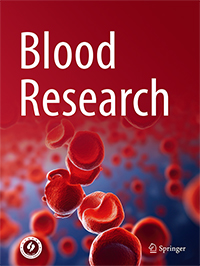Korean J Hematol 2003; 38(3):
Published online September 30, 2003
© The Korean Society of Hematology
혈소판증가증에서의 Anagrelide 치료 효과
김진영, 김유진, 정병하, 류찬란, 고지송, 박윤희, 김희제, 이석, 김동욱, 민우성, 김춘추
가톨릭대학교 의과대학 가톨릭조혈모세포이식센터,
가톨릭대학교 의과대학 내과학교실
Therapeutic Efficacy of Anagrelide for Thrombocytosis
Background : Thrombocytosis can result in life-threatening thrombotic or hemorrhagic events. Anagrelide acts exclusively on megakaryocytes and has been reported as an useful agent in controlling thrombocytosis associated with chronic myeloproliferative disorders.
Methods: Seven patients with essential thrombocythemia and three with chronic myelogenous leukemia were enrolled and early responses and adverse effects of anagrelide were retrospectively analyzed. The drug was started with a dose of 2 mg/day with increases of 0.5 mg/day every 5~7 days as needed.
Results : Anagrelide in starting doses of 2 mg/day reduced the platelet count by 50%, or to less than 600,000/㎣, for at least 28 days in 7 of the 9 (78%) evaulable patients. Adverse effects of the drug were observed in 5 patients and generally well tolerated; headache in 4, gastrointestinal troubles in 2, palpitations and chest tightness in 1, and tinnitus in 1. Changes in hemoglobin or white blood cell counts in peripheral blood were minimal and tolerable.
Conclusion : The present study shows that anagrelide is a useful platelet-lowering agent in whom hydroxyurea or interferon has failed. Long-term efficacy and adverse effects of the drug remain to be determined.
Keywords Anagrelide; Thrombocytosis; Essential thrombocythemia; Chronic myeloenous leukemia;
Article
Korean J Hematol 2003; 38(3): 164-168
Published online September 30, 2003
Copyright © The Korean Society of Hematology.
혈소판증가증에서의 Anagrelide 치료 효과
김진영, 김유진, 정병하, 류찬란, 고지송, 박윤희, 김희제, 이석, 김동욱, 민우성, 김춘추
가톨릭대학교 의과대학 가톨릭조혈모세포이식센터,
가톨릭대학교 의과대학 내과학교실
Therapeutic Efficacy of Anagrelide for Thrombocytosis
Jin-Young Kim, Yoo, Jin Kim, Byung, Ha Chung, Chan, Lan You, Ji, Song Ko, Yoon, Hee Park, Hee, Je Kim, Seok Lee, Dong, Wook Kim, Woo, Sung Min, Chun, Choo Kim
Department of Internal Medicine, Catholic Hematopoietic Stem Cell Transplantation Center, The Catholic University of Korea College of Medicine, Seoul, Korea
Abstract
Background : Thrombocytosis can result in life-threatening thrombotic or hemorrhagic events. Anagrelide acts exclusively on megakaryocytes and has been reported as an useful agent in controlling thrombocytosis associated with chronic myeloproliferative disorders.
Methods: Seven patients with essential thrombocythemia and three with chronic myelogenous leukemia were enrolled and early responses and adverse effects of anagrelide were retrospectively analyzed. The drug was started with a dose of 2 mg/day with increases of 0.5 mg/day every 5~7 days as needed.
Results : Anagrelide in starting doses of 2 mg/day reduced the platelet count by 50%, or to less than 600,000/㎣, for at least 28 days in 7 of the 9 (78%) evaulable patients. Adverse effects of the drug were observed in 5 patients and generally well tolerated; headache in 4, gastrointestinal troubles in 2, palpitations and chest tightness in 1, and tinnitus in 1. Changes in hemoglobin or white blood cell counts in peripheral blood were minimal and tolerable.
Conclusion : The present study shows that anagrelide is a useful platelet-lowering agent in whom hydroxyurea or interferon has failed. Long-term efficacy and adverse effects of the drug remain to be determined.
Keywords: Anagrelide, Thrombocytosis, Essential thrombocythemia, Chronic myeloenous leukemia,





 PDF
PDF Standard view
Standard view Export citation
Export citation Share
Share  Previous Article
Previous Article



